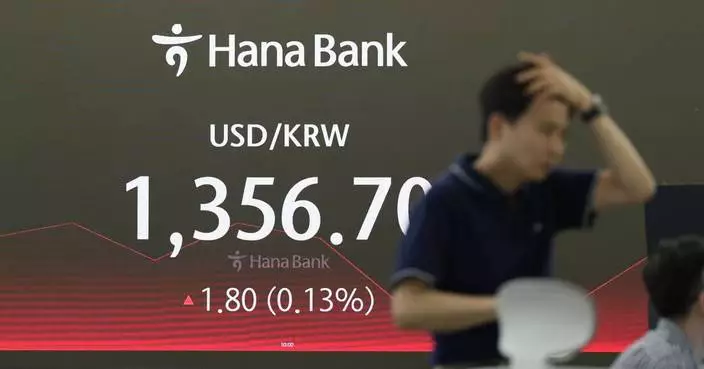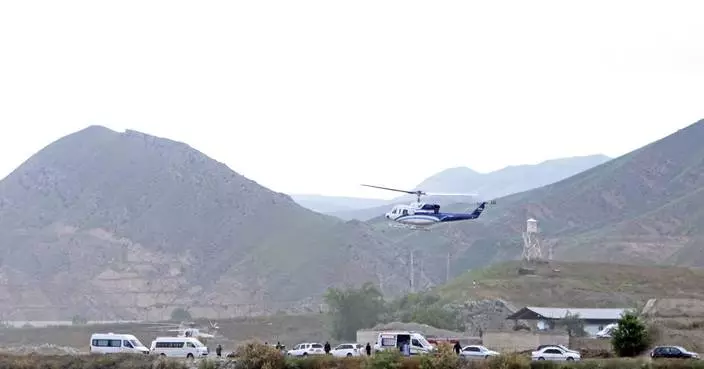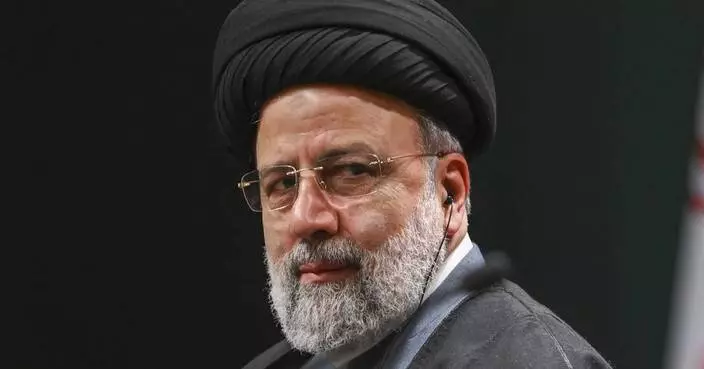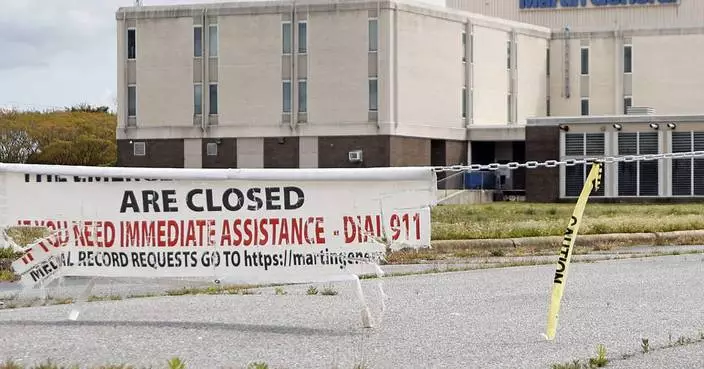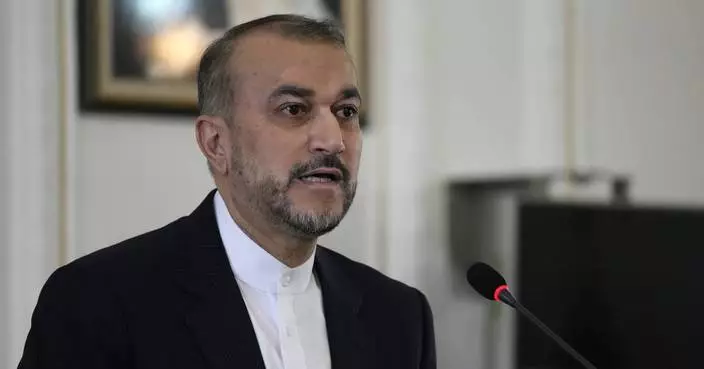WASHINGTON (AP) — Making future military aid to Ukraine contingent on the country participating in peace talks with Russia. Banning Chinese nationals from buying property within a 50-mile radius of U.S. government buildings. Filling the national security sector with acolytes of Donald Trump.
One of several groups trying to lay the groundwork for a second Trump administration if the former Republican president wins in November is out with a new policy book that aims to articulate an “America First” national security agenda.
The book, shared with The Associated Press before its release Thursday, is the latest effort from the America First Policy Institute. Like the Heritage Foundation's “Project 2025," the group is seeking to help Trump avoid the mistakes of 2016, when he entered the White House largely unprepared.
Beyond its policy efforts, the institute's transition project has been working to draft dozens of executive orders and developing a training program for future political appointees. Heritage has been building an extensive personnel database and offering its own policy manuals.
Both groups stress they are independent from Trump's campaign, which has repeatedly tried to distance itself from such efforts, insisting that the only Trump-backed policies are those the candidate articulates himself.
Still Fred Fleitz, the book’s editor, noted that he and retired Lt. Gen. Keith Kellogg, who served for a time as Trump's acting national security adviser and wrote several of the chapters, have been in frequent touch with the former president, soliciting feedback and discussing topics such as Ukraine at length.
“We hope this is where he is. We’re not speaking for him, but I think he will approve," said Fleitz, who formerly served as the National Security Council's chief of staff.
He said he hopes the book will serve as “a guidebook that will be an intellectual foundation for the America First approach" to national security “that’s easy to use.”
“It’s a grand strategy," added Kellogg. “You don’t start with the policies first. You start with the strategies first. And that’s what we’ve done."
The group casts the current trajectory of U.S. national security as a failure, thanks to a foreign policy establishment it accuses of having embraced an interventionist and “globalist” approach at the expense of America's national interests.
While short on specifics, the book offers some guideposts to how a future Trump administration could approach foreign policy issues such as Russia's war against Ukraine. Trump has said, that if elected, he would solve the conflict before Inauguration Day in January, but has declined to say how.
The book's chapter on the war spends more time discussing how the conflict unfolded than how to end it. But it says the U.S. should make future military aid contingent on Ukraine participating in peace talks with Russia.
It predicts the Ukrainian army will likely lose ground over time and advises against the U.S. continuing “to send arms to a stalemate that Ukraine will eventually find difficult to win.” But once there is a peace agreement, it says the U.S. would continue to arm Ukraine as a deterrent to Russia.
The authors seem to endorse a framework in which Ukraine “would not be asked to relinquish the goal of regaining all its territory" but would agree to diplomacy “with the understanding that this would require a future diplomatic breakthrough which probably will not occur before (Russian President Vladimir) Putin leaves office.”
It acknowledges that Ukrainians “will have trouble accepting a negotiated peace that does not give back all of their territory or, at least for now, hold Russia responsible for the carnage it inflicted on Ukraine. Their supporters will also. But as Donald Trump said at the CNN town hall in 2023, ‘I want everyone to stop dying.’ That’s our view, too. It is a good first step.”
The book blames Democratic President Joe Biden for the war and repeats Trump’s claim that Putin never would have invaded if Trump had been in office. Its main argument in defense of that claim is that Putin saw Trump as strong and decisive. In fact, Trump cozied up to the Russian leader and was reluctant to challenge him.
The bulk of the chapter is spent laying out an at times erroneous timeline of Biden’s handling of the war.
Going forward, it suggests Putin could be persuaded to join peace talks if Biden and other NATO leaders offer to put off NATO membership for Ukraine for an extended period. It suggests that the U.S. instead establish a “long-term security architecture for Ukraine’s defense that focuses on bilateral security defense.” It provides no explanation of what this would entail. It also calls for placing levies on Russian energy sales to pay for reconstruction in Ukraine.
The book is critical of Trump's transition efforts in 2016, bemoaning a broad lack of preparation before Trump took office.
“The tumultuous transition of 2016/2017 did not serve President Trump and the nation well and slowed the advancement and implementation of his agenda," the authors wrote. For instance, they note that before the election, Democrat Hillary Clinton's transition team had submitted more than 1,000 names for future security clearance. Trump's team submitted just 25.
The group says it has identified roughly 1,200 national security-related positions that the next administration will need to fill and urges it to be ready on Day 1 with Trump loyalists who adhere to the “America First” approach.
“It's not about retaliating against people or trying to politicize government positions. It's about making sure government workers do their job and keep politics out of their work,” Fleitz said.
The book describes China as the nation's most pressing national security threat, eager to displace the U.S. as the world’s premier power. It proposes a hawkish policy that builds on approaches from both the Trump years and the Biden administration with the goal of making Beijing’s policies “largely irrelevant to American life."
It elevates economic concerns with China to those of national security and proposes a reciprocal approach that would deny Beijing access to U.S. markets in the same way American companies have been denied in China.
The book also recommends more rigorous screening of cyber and tech companies owned by U.S. adversaries, especially China, to make sure they are not collecting sensitive information. It also recommends that Chinese nationals be banned from buying property within a 50-mile radius of any U.S. government property.
It calls for visa restrictions on Chinese students wishing to study in the United States and for the banning of TikTok and other Chinese apps out of concerns for data privacy. Trump, however, has spoken out against a law that would force TikTok's sale or block U.S. access.
The analysts’ views of what an “America First” policy looks like often reflect the writers’ personal focuses.
For Ellie Cohanim, a former Trump deputy State Department envoy charged with monitoring and combating antisemitism, “America First” looks a lot like a shopping list for the Israeli military.
The U.S. should rush Israel a squadron of “25 Lockheed Martin F-35s, one squadron of Boeing’s F-15 EX, and a squadron of Apache E attack helicopters,” Cohanim wrote.
The U.S. should give some of its billions of dollars in military funding to Israel in Israeli currency so Israel can spend it at home, and Washington should push Arab states to foot the bill for the rebuilding of Gaza and accept Israel's shelving any political talks with the Palestinians pending an indefinite period of compulsory deradicalization for the Palestinian people, she wrote.
Colvin reported from New York. Associated Press writer Rebecca Santana contributed to this report.

This image provided by America First Policy Institute, shows the cover of their new book "An America First Approach to U.S. National Security." The group trying to lay the groundwork for a second Trump administration if the former president wins in November is out with a new policy book that aims to articulate an "America First" national security agenda. (America First Policy Institute via AP)

FILE - Russian President Vladimir Putin attends a meeting of the Supreme Eurasian Economic Council of the Eurasian Economic Union at the Kremlin in Moscow, on May 8, 2024. A group trying to lay the groundwork for a second Trump administration if the former president wins in November is out with a new policy book that aims to articulate an "America First" national security agenda. (Evgenia Novozhenina/Pool Photo via AP)

FILE - Former President Donald Trump speaks at an America First Policy Institute agenda summit at the Marriott Marquis in Washington, July 26, 2022. A group trying to lay the groundwork for a second Trump administration if the former president wins in November is out with a new policy book that aims to articulate an "America First" national security agenda. (AP Photo/Andrew Harnik, File)








